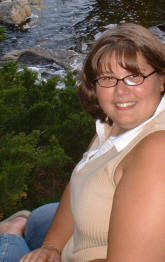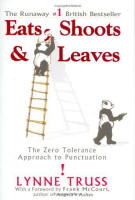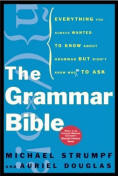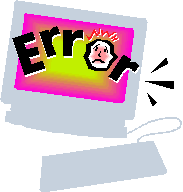|
A
Condensed Explanation of the Quirky English Language
by Jamie Jasmer

Every Monday, Wednesday, and Friday I sit in Hewes Library and I
read the Chicago Tribune. Admirable? Informed?
Intellectual? Maybe. I can honestly say that most of the time
that I read the paper I read it to keep up with current news
because I do not watch very much television. However, I usually
just end up becoming board with the content that I’m actually
reading. The critics are right when they say that Americans are
spoiled and catered to. I would rather listen to a 30 second
sound bite that abbreviates the content than read some lengthy,
detailed article. I just want the basics.
Once in a while, however, breaking away from the dull and drear
of the news, I will find an article that actually peaks my
interest. A few weeks ago I found one such article by
journalist Nathan Bierma titled “Navigating the Oddities of
English Usage” in the November 30, 2005 issue. The content of
his article made me laugh and giggle because as I was reading it
I thought of all the “stupid” English grammar rules that exist.
I reminisced knowing that at some point within the last 3.5
years I have used vulgarities, mumbled angrily at some
professor, or possibly even vocalized my hatred for the
seemingly pointless English rules. How does anyone ever learn
our language when it is too hard for Americans to figure
out? There must be some way to do it! As for me, I’m
still struggling. To give my fellow English majors a step up I
thought I would include the article from Bierma just to help you
with the little things that you might over-look the next time
you write a paper.
Readers continue to wonder about grammar
and other oddities of our tricky language. These days I
find myself reaching for the "American Heritage Guide to
Contemporary Usage and Style" (Houghton Mifflin, 511 pages,
$19.95) as an authoritative arbiter of usage disputes like
these:
Q: I
often see the use of the possessive with the
"'s" after the use of the possessive "of."
For example: "A friend of my sister's." Is
the "'s"
necessary because the word "of" already conveys
the possessive form?
~Murad
Meneshian
Glenview
A: Etymologist
Michael Quinion tackled this recently in his World Wide
newsletter (www.worldwisewords.org).
“The technical name for this construction is double genitive or
double possessive,” Quinine wrote.
He said this form has a long history;
Dickens used it for example, when he wrote “an aunt of my
father’s” in “David Copperfield.”
The double possessive occurs naturally to
English speakers—especially with pronouns: we say “a friend
of mine” but not “a friend of me.”
While “of” does indicate possession, it’s
such a vague and versatile word that the double possessive is
often needed for clarification.
Quinion’s examples are “a bone of the
dog”—which could be taken to mean either a bone the dog
possesses or a bone in the dog’s own skeleton—and a “picture of
Jane,” which means that Jane appears in the photo, not that she
owns it.”
However; Quinion also points out we tend
to use the double possessive only in cases where the owner is a
human or animal, and not for instance, an organization.
We say “Friends of the library” but not
“Friends of the library’s.” Why do English speakers make this
distinction naturally in our speech, without being taught it?
It’s a linguistic mystery.
Q: It seems to be
more often that I want to use a preposition at the end of a
phrase (“that’s what we came for”), which I have tried not to do
at the orders of my English teachers. But the alternatives,
which I sometimes use just to feel like I’ve written properly,
can be so awkward (“it is that for which we came”).
Any advice for using this device
appropriately without ending every sentence in a preposition?
~Emily Varner,
Wheaton
A: Your instincts
are right: joining a verb with a preposition to form a “phrasal
verb” is perfectly natural in English and always has been
(Shakespeare wrote in “The Tempest,” for example, “We are such
stuff as dreams are made on.”) According to the “Guide to
Contemporary Usage,” it was 17th Century poet John
Dryden who started the successful campaign to have this practice
frowned upon. But as the “Guide” says, “English syntax not only
allows but sometimes even requires final placement of a
preposition” – indeed, just try to move “upon” in the previous
sentence. It doesn’t work.
For sanity’s sake, unless you’re writing a
book or business report or giving a Nobel Prize acceptance
speech you can probably ignore this and many other picky
grammatical commands of your English teachers. Few of them are
helpful or sensible for informal, everyday communication.
Q: Is it “farther”
or “further?” I was taught that the word “farther” denotes
physical advancement in distance while “further” denotes
advancement to greater degree, as in time. Yet I hear many
people, most notably Chicago meteorologists and traffic
reporters, when denoting distance, use the word “further”
instead of “farther.” Is “further” another one of those words,
because of repeated incorrect usage, whose definition has been
broadened to denote distance as well?
~Mark Zurblis,
Geneva
A: It’s actually
one of those words whose definition has always been flexible in
the history of English, but which language elites – the same
folks who enforced the bizarre ban on prepositions at the end of
sentences – decided to insist could only mean “degree” and not
“distance.”
It’s advisable to try to follow the
distance-or-degree distinction between “farther” (if you can go
“far,” you can go “farther”) and “further” (a synonym for “more”
– “let’s discuss this further”) in formal settings and disregard
it in informal ones. But note that the line between distance
and degree can be blurry; the “Guide to Contemporary Usage”
point out that most educated users say “far from the truth” but
also “nothing could e further from the truth.”
After reading this
article I wasn’t quite sure what to think. Apparently good
grammar only matters when you’re writing or speaking for
something academic or formal. If this is the case, then why are
students taught that it should be used within everyday
language? I did discuss my peaked interest with fellow students
after reading this article. Talking about the confusing aspects
of the English language, several elements came up repeatedly in
conversation: commas, run-on sentences, the difference between
“then” and “than,” and “affect” and “effect” just to name a
few. Hewes Library does not currently have The American
Heritage Guide to Contemporary Usage and Style book in its
collection (I checked). However, if you run a search on
Amazon or Google there are plenty of sites that you can purchase
it from. I am sure that it would be a great investment for any
of you wonderful English majors. Put it on your Christmas list
for mom and dad and enjoy.

|








